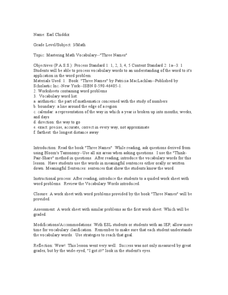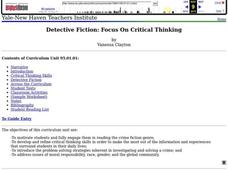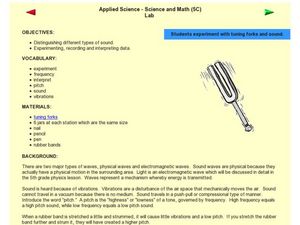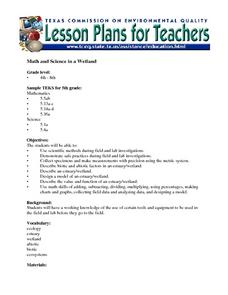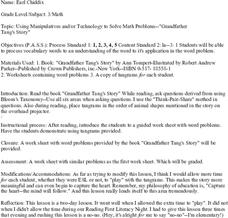Curated OER
Mastering Math Vocabulary- The Three Bears
Integrate reading and math to increase your class' vocabulary. Read The Three Bears by Paul Galdone. Then have your third graders complete a worksheet containing math problems related to the story.
Curated OER
Polluting the Environment
Fourth graders construct mini-ecosystem, pollute the ecosystem, observe, collect, and record data on the effects of these pollutants on their ecosystem, organize data on spreadsheets, create graphs, and design presentations to share with...
Curated OER
three Names Lesson
After the book Three Names is read aloud, math vocabulary is introduced . Either alone or in groups, learners use the vocabulary words in a meaningful sentence. Then they complete the provided worksheet.
Curated OER
Detective Fiction: Focus On Critical Thinking
Turn your 6th graders into detectives while growing their love of reading. Using critical thinking skills, they will be able to describe the five basic elements of detective fiction, read detective novels, make predictions, use the...
Curated OER
Focusing on Lenses
Young scholars explore scientific observations by examining the parts of a microscope. In this optics lesson plan, students discuss the importance of a focal point and focal distance when utilizing an optical device such as a microscope....
Curated OER
Sound Observations
Students explore sound waves by conducting an experiment in class. In this sound frequency lesson, students utilize a tuning fork in class and identify which objects in class create different sound pitches on the fork. Students conduct...
Curated OER
Crazy for Cubes: Art and Science
Learners discuss Sol LeWitt and conceptual art, then analyze the differences in expressing a concept through model-based inquiry and aesthetic art criticism. They develop a geometric, scientific, or mathematical concept, then create an...
Curated OER
An Introduction to Simple Machines
Students investigate simple machines and their uses in everyday life. In this scientific method lesson, students examine physical tools such as wedges, screws, and levers using a "how does it work" approach. Students complete...
Curated OER
Wavelengths of Light
Explore physical science by participating in a visual spectrum experiments. Budding scientists identify the colors in the color spectrum and view the colors in class by utilizing cellophane, flash lights, and other arts and crafts...
Curated OER
Designing a Study
Students explore features to consider when designing a scientific study. In this science research lesson, students examine different methods of data collection and consider which method would be appropriate for determining how many types...
Curated OER
Mass vs. Weight
Students explore physical science by conducting a measurement experiment. In this mass lesson, students identify the differences between mass and weight and define a list of other vocabulary terms. Students utilize electronic scales and...
Curated OER
The 3 R's of Common Denominators
Third graders are shown an alternative method of determining the lowest common denominator of two or more unequal denominators. They complete a worksheet.
Curated OER
Classifying and Constructing Corners
Fifth graders, after seeing Honeycomb examples, complete a Classifying Angles worksheet, Clock worksheet, and Defining Angles worksheet.
Curated OER
One Square Meter
Learners examine various ecosystems using scientific inquiry. Using the local area, they assess the characteristics and conditions in one square meter. They report their findings in the form of a survey map and data sheet. They...
Curated OER
Investigating the Probability
Students investigate probability using coins and dice. They collect data, graph, organize and interpret data. They predict, describe, compare, compute and draw conclusions based on what they observe and record.
Curated OER
Applied Science-Science and Math (2A) Post Lab
Second graders create a graph about TV watching. In this bar graph lesson, 2nd graders make a hypothesis about how much TV 2nd graders watch per week. They record their TV watching for a week and bring it to school to create a class graph.
Curated OER
Anamorphosis
Students classify optical illusions according to their distinguishing characteristics. They create anamorphic art and use Mylar flexible mirrors to view and then they describe and analyze the optical illusion.
Curated OER
Data Scavenger Hunt
Eighth graders discuss how data is collected and participate in data collection through a survey. They complete a scavenger hunt on the Internet to gain understanding of the data measures mean, median, mode, and range.
Curated OER
Math and Science in a Wetland
Learners describe safe practice when doing field and lab investigations in a estuary or wetland. They create a model of an estuary and describe their value and function. They participate in field study in which they collect and analyze...
Curated OER
You Can Do It: Creating How-To Videos
Learners create instructional videos. in this video lesson, students choose a subject area and topic to make their own how-to video. They research this topic and film their video using a flip-camera.
Curated OER
Grandfather Tang
Third graders read Ann Tompert's book, Grandfather Tang's Story, and complete math word problems based on the story. In this word problems lesson plan, 3rd graders use tangrams in the word problems.




